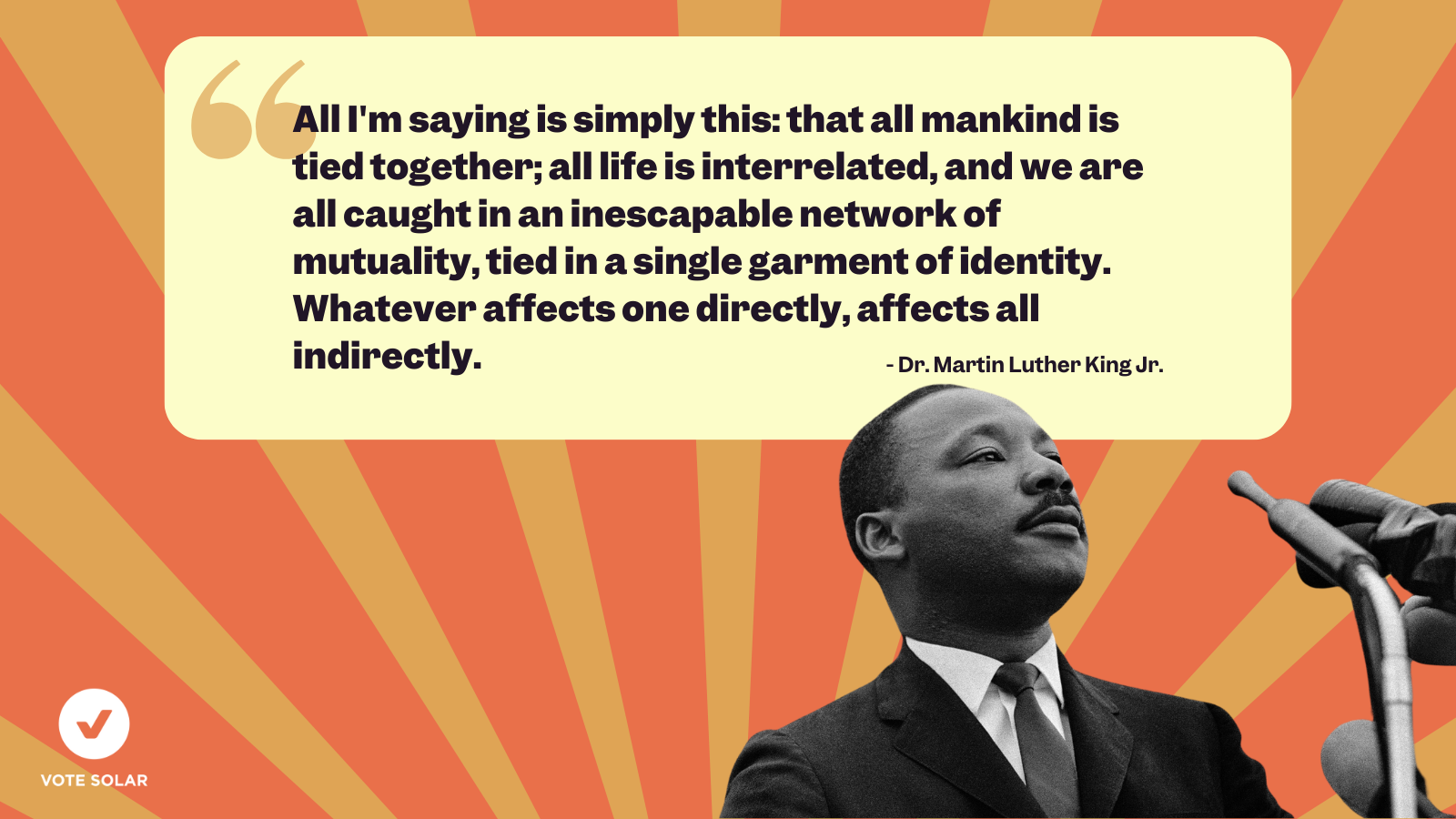Reflections on Dr. King’s Interconnectedness
Reflections on Dr. King’s Interconnectedness
William Munn, PhD
From the confines of a Birmingham jail in 1963, where he courageously stood as a participant in demonstrations against segregation, Dr. Martin Luther King, Jr. penned a heartfelt letter in longhand. His powerful words serve as a poignant reminder that individuals bear a moral duty to boldly stand against injustice and champion the cause of equality.
“We are caught in an inescapable network of mutuality, tied in a single garment of destiny. Whatever affects one directly affects all indirectly.” – Dr. Martin Luther King, Jr., Letter from Birmingham Jail
I feel pulled to reflect on this particular portion of the letter as I think about Dr. King’s legacy and how it shines on work in the energy landscape. Across industries and disciplines, activists and academics, there is always talk of how our different issues touch and intersect. It rightly blows our minds every time.
In academic circles, there’s reverence for the work of Kimberlé Williams Crenshaw, who coined the term intersectionality, the study of overlapping or intersecting social identities and related systems of oppression, domination, or discrimination. In clean energy, interconnection is what brings us all to the grid, the set of rules that dictate how clean energy resources such as solar can be safely and reliably connected to the electricity grid. In Dr. King’s letter, he speaks about interconnectedness, where none of us are outsiders – where injustice anywhere is a threat to justice everywhere.
I think about themes of connection every day in our work. I’m immensely proud to be led by frontline and Black-led organizations, who are boundless teachers to me and my colleagues. They connect us to the truth and ground us to our mission. But people are exhausted and overburdened. Even the folks who can muster up the time out of their schedule to advocate for their rights, are shut out by bureaucratic hindrances and additional systemic barriers like educational resources for the highly-technical system of interconnection.
All in all; it just shouldn’t be this hard to keep someone’s lights on. When we think of the topic of energy burden, defined by the U.S. Department of Energy (DOE) as “as the percentage of gross household income spent on energy costs,” low-wealth households experience a disproportionately higher energy burden. This is an extremely common disparity, and I highly recommend you visit the DOE’s Low-income Energy Affordability Data (LEAD) Tool that illustrates this major systemic issue.
In honoring Dr. King’s pursuit of Black liberation, let’s remember he was seen as a trailblazer of his time, paying the ultimate price for his beliefs. Courageously standing with systematically oppressed communities, he challenged the institution of white supremacy. His commitment to interconnectedness, ensuring no one was left behind, remains a powerful catalyst for change. At Vote Solar, we understand that the pursuit of racial justice and climate justice are tied – for a true and just transition, we must unroot, dismantle, and redress all forms of anti-Blackness and structural, systemic racism. This attitude is what inspires our work as environmental advocates and exemplifies how crucial the demystification and access to interconnection for all people is.
Interconnection is particularly important to frontline communities due to decades of underinvestment in grid infrastructure in their communities. This resulted in old infrastructure in their communities and, in some cases, challenges in reliability. Historically marginalized communities that have an opportunity to develop local clean energy projects will need to navigate the interconnection process, which can often be very technical, overly complex, and costly. This dynamic is inequitable. The key to communities securing low-cost, reliable energy is ensuring that the process is clarified, easily accessible and fully understood by the members of these communities.
Dr. Martin Luther King Jr.’s legacy calls upon us to collectively confront the systemic inequities that persist in our shared world. This is particularly crucial as we strive for a future powered by clean energy, one that grants liberation to all and bequeaths future generations with a habitable and sustainable Earth. By prioritizing the empowerment of Black-led organizations and Black advocates who have firsthand experience working with frontline, low-wealth, and energy-burdened communities, we will strengthen the diversity of our movement. We believe that this diversity will enrich our understanding and allow us to devise more effective, equity-centered solutions. Let us work together to reshape the energy landscape, making it more inclusive, sustainable, and just for all.
Black-led organizations to follow:
- Center for Energy Education, North Carolina: https://center4ee.org/
- Greening Youth Foundation, Georgia: gyfoundation.org
- Hip Hop Caucus, National: https://hiphopcaucus.org/
- National Black Environmental Justice Network, Louisiana: https://www.nbejn.com/
- Freedom Agenda, New York: https://fa.urbanjustice.org/
- Detroiters Working for Environmental Justice, Michigan: https://detroitenvironmentaljustice.org/
- The Black Hive, National: https://m4bl.org/the-black-hive/
- Green the Church, National: greenthechurch.org
- Blacks in Green, Illinois: blacksingreen.org
- Black Parents United Foundation (BPUF), Colorado: https://www.blackparentsunitedfoundation.org/
- Black Appalachian Coalition (BLAC), Pennsylvania: blackappalachiancoalition.org
- Black Voters Matter, Georgia: https://blackvotersmatterfund.org/
- Partnership for Southern Equity, Southeast: https://psequity.org/
- Deep South Center for Environmental Justice, Southeast: https://www.dscej.org/
- Florida Rising, Florida: https://floridarising.org/


